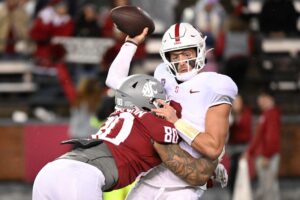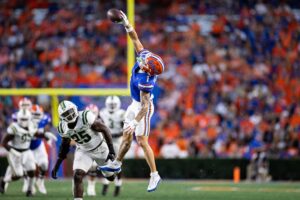On Thursday Michigan football head coach Jim Harbaugh wrote an open letter addressed to the “College Football Community.” In said letter Harbaugh wrote a proposal that would provide college football players with more flexibility.
Jim Harbaugh Open Letter Is Great, but Has a Serious Flaw
In the letter (the full contents are posted at the end of this article) the coach of the Wolverines largely argues the merits of providing collegiate football players more flexibility and freedom. There’s a decent amount to digest in the letter, but the two main points focus on when a player should be allowed to declare for the draft and what should happen if they fail to get selected.
Current Rules
Players currently have to wait until they are at least three years removed from high school before they can be draft eligible. Players also cannot, under the current model, return to school if they enter the NFL draft but go undrafted.
Harbaugh’s Proposal
This proposal by Jim Harbaugh addresses both of those issues. Under what Jim Harbaugh has proposed, players could opt to declare for the NFL draft after any season they choose. This seems to be essentially equivalent to basketball’s “one and done” rule. While this could potentially hurt the product on the collegiate field (the game is obviously better when players like Trevor Lawrence remain in school), this opportunity should be afforded to all players. In basically every profession outside of sports, individuals can start earning a living professionally whenever they would like; they do not necessarily have to finish a certain number of years of college. But collegiate football players have this three-year restriction placed on them and it shouldn’t be.
Harbaugh’s proposal also advocates for a player being able to return to the collegiate ranks without facing a penalty if they are not drafted within the first 224 picks of the draft, provided they have not received any compensation from an agent and they are still academically eligible/compliant.
Questions That Must Be Answered
On the face of it what Jim Harbaugh has proposed regarding a player returning to school seems extremely fair and practical. It would be tremendous if college football players were allowed to go through the draft process and if they are not selected they could return to school, with no penalty.
However, this would cause issues that need to be addressed, such as what happens if a school/team has already “replaced said player” with a new recruit? Would the player who returned to school after entering the draft be allowed to enter the transfer portal with no penalty and essentially become a free agent at the collegiate level? If yes, would any restrictions be placed on the player’s “free agency?” Would they only be eligible to play for schools outside of their previous conference or could they sign with any school? What would happen to the player’s possible replacement should the player return after not being drafted and play for his previous school? How would the limited number of scholarships be handled? Would a scholarship have to be taken away from another player? Would the returning player not be granted their previous scholarship? Would extra scholarships be provided in the instance of a player returning to his previous school? If so, would there be a cap placed on the number of extra scholarships a team could use? These are all questions that must be answered for Jim Harbaugh’s proposal to work.
Last Word
The underlying idea of Jim Harbaugh’s proposal is great. Players should be afforded much more flexibility and freedom than they currently are. Players and their families should be able to decide when they feel they are ready to enter the next level and become a professional. But for what Jim Harbaugh has proposed to become reality, certain questions must be adequately addressed.
May 7, 2020
An Open Letter to the Football Community-
In my opinion, we are in need of constructive, proactive discussion about the evolving issues facing intercollegiate football. In today’s world, many young men and their families perceive college football as preventing them from earning a living as a professional football player. That is not an unreasonable perception given the rules currently in place. The discussion centers around two of our present models of football, the intercollegiate amateur model and the professional model, and most importantly, those who participate in those models. Much of that discussion centers around when the college experience ends and the professional career begins. The parties most affected in this discussion are the student-athlete and their families. The crux of my proposal is to put the decision in the hands of the family and the demand of the National Football League. Presently, the decision excludes the family until the student-athlete is three years removed from high school.
My first proposal is that we put this decision to “go or stay” in the hands of the individual and his family, not in the form of an NFL, NFLPA or NCAA rule, while allowing the player to return to college football if he does not sign. This would change both the existing rule that requires a football player to be three years removed from high school in order to be draft eligible and the rule that does not let the nondrafted player return to college if he chooses.
Proposal:
- The individual could choose to declare for the professional draft after any season he chooses. If he is drafted within the first 224 picks of the NFL Draft, or chooses to sign a free agent contract, he would forego remaining college eligibility. However, if the individual is not drafted within the first 224 picks of the NFL Draft, he would be able to return to college football if he chooses without penalty, provided he remains in academic compliance and does not receive payment from an agent.
- The individual leaving college “early” prior to graduation who signs an NFL contract would be entitled to complete his degree while in the NFL, or return to the institution that he left, to continue his college career as a student once his pro career was completed. This would be done at the expense of the University based on a schedule of years participated in college. (For example, if the student-athlete played one year in college he is entitled to one additional year of paid schooling; if he plays in two or three years in college he is entitled to two additional years of paid schooling; if he plays four years in college he is entitled to one additional year of paid schooling – however, he would no longer have intercollegiate football eligibility). Such a policy promotes higher education as a top priority.
- A broadening of the rules to permit a student-athlete and his family to consult with and seek advice on or before signing a professional contract from lawyers and agents so long as the S/A does not receive compensation. The stakes and complexities involved require players to be well informed and this is the time to begin encouraging them to be intelligent and informed.
Further areas for debate and study would include:
A future model to consider:
A clean, clear and concise college eligibility of five years for football without a “red shirt” clause needed to compete for five years.
A consideration of eliminating the current “hard cap” rule which limits each school to a combined maximum of 25 scholarships per year for incoming freshmen and transfers each year.
I continue to support:
The current graduate transfer rule allowing a graduate to transfer without sitting out.
The proposed “One Time Transfer” rule allowing a S/A, a one-time transfer to another school without sitting out.
Further explanation to the thought process:
I was fortunate to attend the University of Michigan on a football scholarship, played football and earned a meaningful academic degree over a five-year period of time. After graduating, I was drafted by the Chicago Bears. By my 30th birthday, I was blessed and fortunate to have played professional football for seven years and accumulated enough money to put my family in a good place, with a degree that presented opportunities outside of football as well. While that was great for me and can be for many current football athletes, it may not be best for all. There are “early bloomers”, capable of competing in the NFL and earning a livelihood at an earlier age. The goal would be to create a scenario that makes adjustments for all current and future studentathletes that puts the timeline for transition to professional football at their discretion and that of their family. I propose an option that allows them to make the decision that is best for them.
Families, and sons could have a clearer, more concise and fact driven approach to their future. For example, if one is a student and athlete talented enough to be offered a football scholarship to college, he could choose to continue his studies and playing career at the amateur level. After any season during his college career that he would feel ready to be a pro, he could declare himself eligible to be drafted. If drafted approximately the first 224 picks he would have to start his pro career and no longer be eligible to compete in college football. If not drafted in the first 224 picks he could choose to return to college with his eligibility intact or choose to sign an NFL free agent contract and also forgo his remaining college eligibility.
The average pro career is three to four years. When a players’ pro career is complete, he could return to college to finish his degree. He is then not denied his professional opportunity and is more mature and likely more motivated to finish his college education and receive his degree. He also is uniquely positioned to enhance the educational experience of other classmates on campus. This option creates a scenario more likely for more young men to have reached thirty having earned both a pro career and a college degree.
The proposal described above would allow the individual to pursue his dream as a student and as a professional athlete in the time frame that best suits his best interests of his own free will and ability. I welcome all concerned to participate in a meaningful discussion and I also welcome the opportunity to
participate. I want to personally thank my father, Jack Harbaugh, and Athletic Director Warde Manuel for their extensive input and discussion, and President Mark Schlissel for his conversation regarding my views on this subject. These views are my own and are not necessarily those of the University of Michigan.
Best Regards,
Jim Harbaugh
Main Photo






